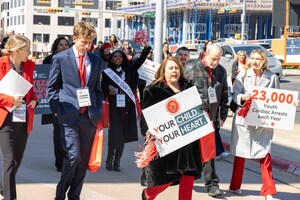
Emergency drill tests St. Louis' response to stroke
ST. LOUIS, May 25, 2017 /PRNewswire-USNewswire/ -- Ambulance lights flashed and first responders raced to the scene Thursday as part of a simulation exercise for a life-threatening medical event that happens about every 40 seconds in the U.S. The emergency was stroke, which claims approximately 3100 lives in Missouri each year.
"Tornado drills, fire drills, intruder drills. We regularly practice for events we hope never to encounter, so if the unthinkable happens, a system is in place to respond quickly and save lives. It only makes sense to have these sorts of drills for medical emergencies like stroke," said Jin Moo Lee Professor, Neurology Attending Physician, Stroke Service at Barnes-Jewish Hospital BJC Institute of Health at Washington University, and American Heart Association/American Stroke Association volunteer involved with the stroke simulation exercise.
Thursday's drill was designed to test and improve the public's knowledge for responding to the nation's No. 5 cause of death. The drill demonstrated that time is critical when someone is having a stroke and that activating the emergency medical system immediately results in quicker, better care. When it comes to stroke, the speed of the response may make the difference between full recovery and permanent disability or death.
"Overall, the stroke simulation went really well and I feel confident in our system of care for acute ischemic stroke. Of course, the system hinges on the public making that call to 911 at the very first sign of stroke. Time is everything during stroke and calling 911 gives you or your loved on the best chance of reaching help within the narrow treatment window," said Brian Fields, Chief Medical Officer for Northeast Ambulance & Fire Protection District.
Treatments like clot-busting drugs and medical device procedures are available for ischemic stroke, which accounts for about 87 percent of all strokes, but treatments are time dependent. The American Stroke Association teaches the acronym F.A.S.T. to help people remember the most common signs of stroke: If you spot sudden (F)ace drooping, (A)rm weakness, or (S)peech difficulty, it's (T)ime to call 911.
The stroke simulation was organized by the American Heart Association/American Stroke Association with participation from local businesses, Northeast Ambulance & Fire Protection District and Barnes-Jewish Hospital. To learn more about stroke, visit www.StrokeAssociation.org.
| Media Resources: |
- Infographic: Attacking Brain Clots to Save Lives |
About the American Stroke Association
The American Stroke Association is devoted to saving people from stroke — the No. 2 cause of death in the world and a leading cause of serious disability. We team with millions of volunteers to fund innovative research, fight for stronger public health policies, and provide lifesaving tools and information to prevent and treat stroke. The Dallas-based association was created in 1997 as a division of the American Heart Association. To learn more or to get involved, call 1-888-4STROKE or visit StrokeAssociation.org. Follow us on Facebook and Twitter.
SOURCE American Heart Association






Share this article